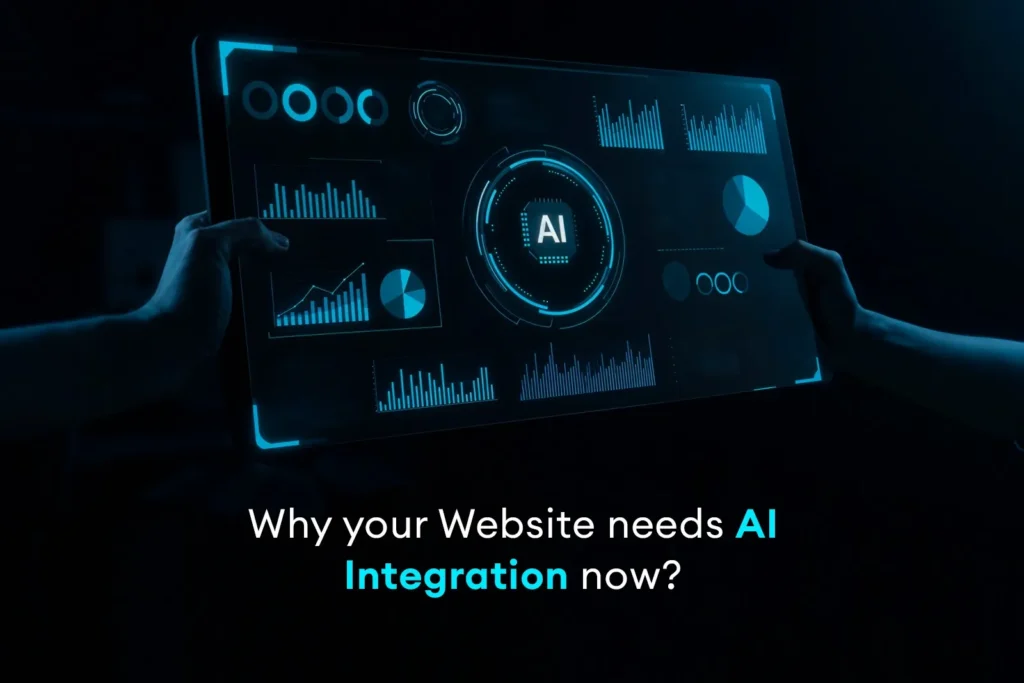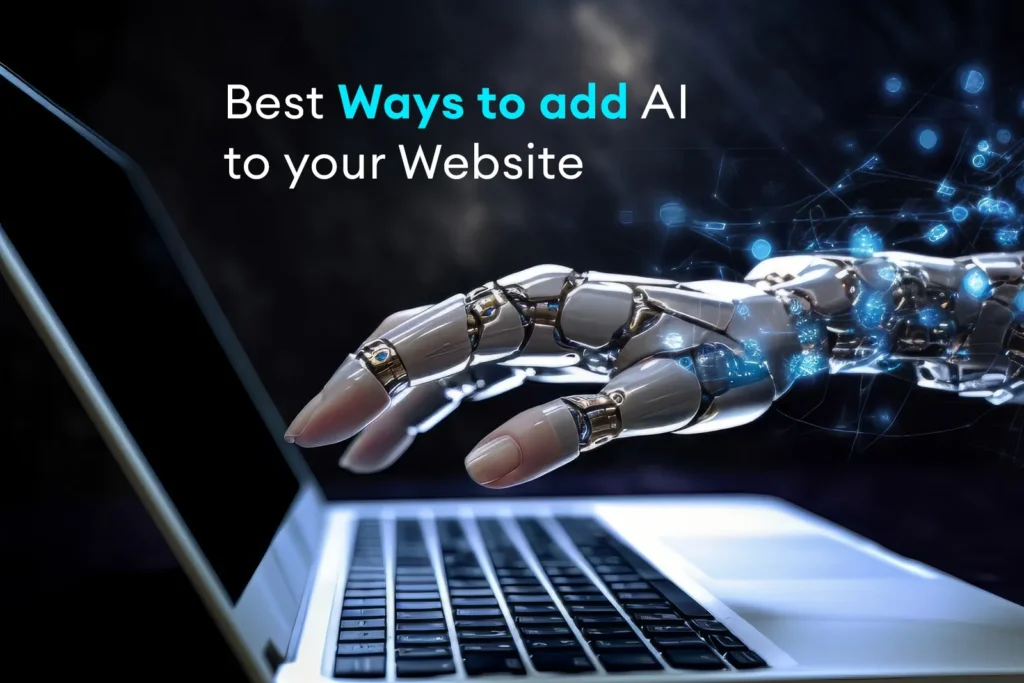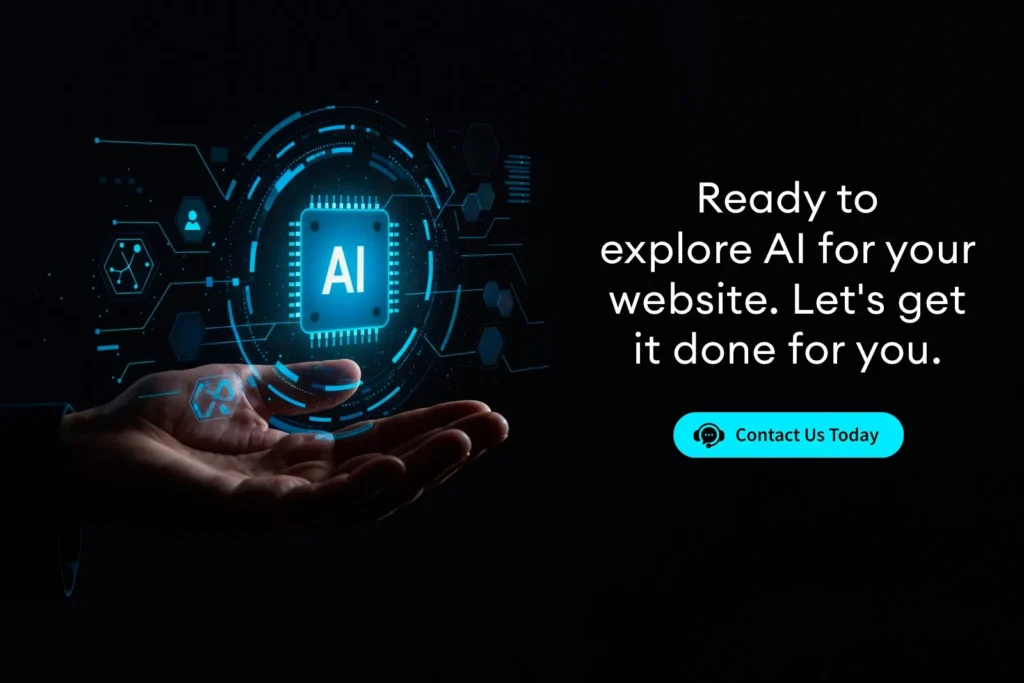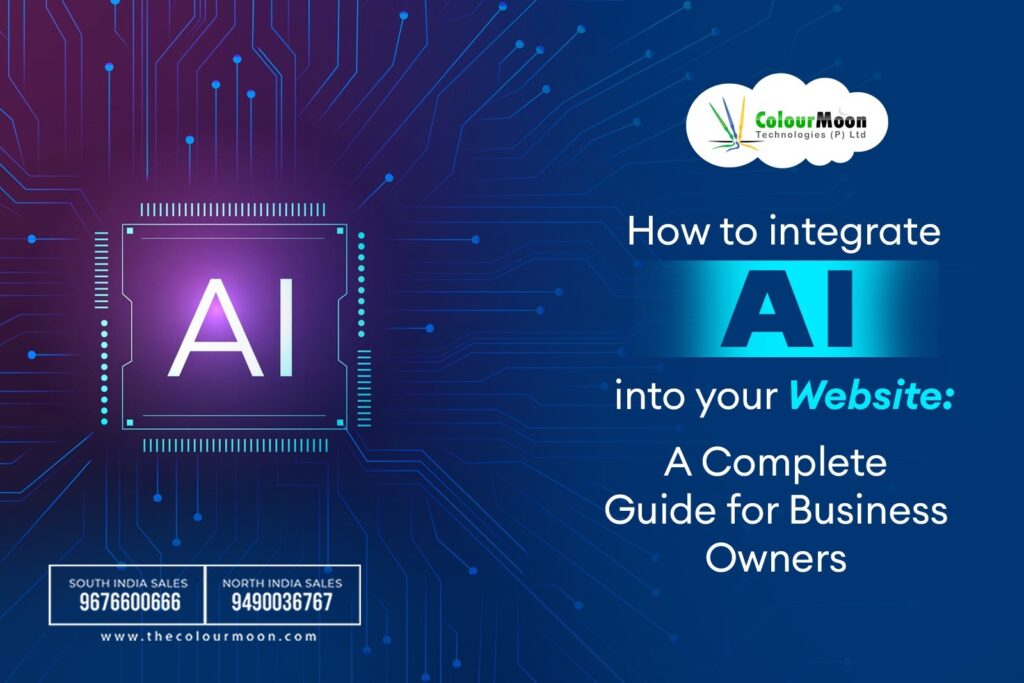AI can greatly improve and simplify website development. Businesses that integrate AI into their websites can suggest their products based on customer behaviour, recent purchases, and browsing history, which can result in sales and engagement. AI-driven search tools can fetch customer requirements, even with incomplete or incorrectly spelt queries. It also assists in adjusting product prices instantly, based on demand and competitors’ pricing, maintaining business competitiveness. AI chatbots offer immediate support, addressing queries, assisting with purchases, and managing returns without human agents. Understanding how to integrate AI into your website is crucial for progressive business owners. The incorporation of AI into websites has transformed user experiences, simplified operations, and generated new income opportunities for businesses across sectors.
Learning how to integrate AI into your website involves strategic planning, technical execution, and ongoing improvement. Modern AI integration spans from chatbots and personalisation engines to predictive analytics and automated content creation. According to recent industry research, Companies implementing AI are seeing an average revenue increase of 10-12%, and the technology is projected to enhance profitability by 59% by 2035 (SellersCommerce). Here are some Essential Steps to Integrate AI Into Your Website
1. Frame a Solid AI Strategy and Objectives
Begin by identifying specific business goals that AI can address on your website. Whether you’re aiming to improve customer service, increase sales conversions, or enhance user personalisation, having clear objectives guides your AI implementation strategy. Conduct a thorough analysis of your current website performance, user behaviour patterns, and pain points that AI could resolve. This foundational step ensures your AI integration aligns with broader business objectives and delivers measurable results.
2. Choose the Updated AI Tools and Platforms
Select AI solutions that match your technical capabilities and budget constraints. Popular options include chatbot platforms like Intercom or Drift, personalisation engines such as Dynamic Yield, and analytics tools like Google Analytics Intelligence. Evaluate each platform’s integration complexity, scalability, and ongoing support requirements. Consider starting with user-friendly, plug-and-play solutions before advancing to custom AI development for more sophisticated implementations.
3. Implement Intelligent Chatbots and Virtual Assistants
Deploy conversational AI to handle customer inquiries, provide product recommendations, and guide users through your website. Modern chatbots can understand context, maintain conversation flow, and escalate complex issues to human agents seamlessly. Configure your chatbot with frequently asked questions, product information, and personalised responses based on user behaviour. This implementation typically requires integrating APIs, training the AI model with your specific data, and continuous refinement based on user interactions.
4. Add Personalisation and Recommendation Systems
Integrate AI-powered personalisation engines that analyse user behaviour, preferences, and browsing history to deliver customised content and product recommendations. These systems use machine learning algorithms to predict user interests and present relevant information dynamically. Implementation involves setting up data collection mechanisms, configuring recommendation algorithms, and creating dynamic content areas that adapt to individual users in real-time.
5. Integrate Predictive Analytics and Data Intelligence
Implement AI-driven analytics tools that provide insights into user behaviour, predict trends, and identify optimisation opportunities. These systems analyse vast amounts of data to uncover patterns invisible to traditional analytics methods. Set up predictive models for user lifetime value, churn prediction, and conversion probability. This integration requires connecting your website data sources with AI analytics platforms and establishing automated reporting systems.
6. Optimise for Voice Search and Natural Language Processing
Incorporate voice search capabilities and natural language processing to accommodate changing user search behaviours. Optimise your website content for voice queries, implement schema markup for better search visibility, and consider adding voice-activated features. This involves updating your SEO strategy, restructuring content for conversational queries, and potentially integrating voice recognition APIs for enhanced user interaction capabilities.
7. Test, Monitor, and Continuously Improve AI Performance
Establish comprehensive testing protocols to measure AI effectiveness and user satisfaction. Monitor key performance indicators such as engagement rates, conversion improvements, and user feedback. Implement A/B testing for different AI configurations and continuously refine algorithms based on performance data. Regular monitoring ensures your AI integration delivers expected results and adapts to changing user needs and technological advances.
Why Your Website Needs AI Integration Now?

The digital world is at a crucial juncture, where AI integration is not just helpful but vital for businesses. Consumer demands have significantly changed, as people now anticipate customised, smart, and immediate responses from their online interactions. Companies that postpone AI integration face the risk of losing ground to rivals already using these technologies to gain market share and strengthen customer relationships.
Today’s technological environment provides exceptional chances for AI implementation, with more accessible tools, lower expenses, and established frameworks than previously. Businesses that embrace AI early are gaining important advantages by developing more engaging user experiences, boosting operational effectiveness, and gaining insightful data that aids in strategic planning. Some Key Reasons Why Your Website Needs AI Integration Now:
1. Enhanced User Experience and Engagement: AI dramatically improves user satisfaction by providing personalised, relevant content and interactions tailored to individual preferences and behaviours. Machine learning algorithms analyse user patterns to predict needs, offer relevant suggestions, and streamline navigation paths. This personalisation leads to longer session durations, reduced bounce rates, and increased user loyalty. AI-powered features like smart search, content recommendations, and adaptive interfaces create intuitive experiences that keep visitors engaged and encourage return visits.
2. 24/7 Customer Support and Instant Response Capabilities: AI-powered chatbots and virtual assistants provide round-the-clock customer service without human intervention, ensuring no inquiry goes unanswered regardless of time zones or business hours. These systems handle routine questions, provide product information, process simple transactions, and escalate complex issues to human agents when necessary. This constant availability significantly improves customer satisfaction while reducing operational costs and allowing human staff to focus on high-value activities requiring personal attention.
3. Increased Conversion Rates and Revenue Generation: AI optimisation tools analyse user behaviour in real-time to identify conversion opportunities and implement dynamic changes that maximise sales potential. Predictive analytics identify high-intent visitors, personalised product recommendations increase average order values, and intelligent pricing strategies optimise revenue. Studies show developers who use AI tools report a 30-40% increase in productivity through targeted messaging, optimised user flows, and personalised shopping experiences that guide customers toward purchase decisions.
4. Advanced Data Analytics and Business Intelligence: AI transforms raw website data into actionable insights through sophisticated pattern recognition and predictive modelling capabilities. These systems identify trends invisible to traditional analytics, predict customer behaviour, forecast demand, and reveal optimisation opportunities across all business functions. Advanced AI analytics provide a deeper understanding of customer journeys, content performance, marketing effectiveness, and operational efficiency, enabling data-driven decisions that drive sustainable growth and competitive advantages.
5. Competitive Advantage and Market Differentiation: Early AI adoption establishes significant competitive positioning while many businesses still rely on traditional web technologies. AI-powered websites offer superior user experiences, more efficient operations, and innovative features that distinguish brands in crowded marketplaces. This technological leadership builds customer trust, attracts tech-savvy consumers, and creates barriers for competitors attempting to match your capabilities. First-mover advantages in AI implementation often translate into long-term market share gains and brand leadership positions.
6. Operational Efficiency and Cost Reduction: AI automation eliminates repetitive tasks, reduces manual workloads, and optimises resource allocation across website operations. Automated content management, intelligent inventory tracking, dynamic pricing adjustments, and predictive maintenance reduce operational costs while improving service quality. AI systems handle routine processes more consistently and efficiently than human operators, minimising errors and freeing staff for strategic activities. These efficiency gains typically result in significant cost savings within months of implementation.
7. Improved SEO Performance and Search Visibility: AI enhances search engine optimisation through intelligent content optimisation, automated technical SEO improvements, and advanced analytics that identify ranking opportunities. Machine learning algorithms optimise content for search intent, improve site structure for better crawlability, and personalise meta descriptions for higher click-through rates. AI tools also monitor search algorithm changes and automatically adjust optimisation strategies, maintaining strong search visibility and driving organic traffic growth consistently.
8. Future-Proofing Your Digital Presence: AI integration prepares websites for evolving technological landscapes and changing consumer expectations in digital interactions. As voice search, visual recognition, and conversational interfaces become standard, AI-integrated websites adapt seamlessly to these trends. Early implementation establishes the technical infrastructure and organisational capabilities necessary for adopting emerging technologies. This forward-thinking approach ensures long-term relevance and positions businesses to capitalise on future innovations without major overhauls or rebuilds.
Best Ways to Add AI to Your Website

The world of AI integration has changed a lot, giving companies various ways to improve their online presence using smart technology. Current strategies for integrating AI put users first, aiming to provide instant benefits while laying the groundwork for more sophisticated features. The AI tools available now are easier to use, more affordable, and more capable than before, letting businesses of all types benefit from complex technologies.
Current AI integration trends prioritise smooth user experiences, data handling that respects privacy, and results that can be tracked. The most effective implementations combine several AI technologies to build comprehensive intelligent systems that adjust to users’ needs and company goals automatically.
1. Advanced Conversational AI and Intelligent Chatbots: Deploy next-generation conversational AI systems that understand context, maintain multi-turn conversations, and provide human-like interactions across multiple languages and communication channels. Modern chatbots integrate with CRM systems, access real-time inventory data, and process transactions seamlessly. These systems use natural language understanding to interpret user intent accurately, provide personalised responses based on browsing history, and learn from each interaction to improve future conversations. Implementation includes voice-enabled chat options and integration with popular messaging platforms.
2. Dynamic Content Personalisation Engines: Implement sophisticated personalisation systems that create unique website experiences for each visitor based on demographic data, browsing behaviour, purchase history, and real-time interactions. These engines dynamically adjust content, product displays, pricing, and navigation elements to match individual preferences and maximise engagement. Advanced personalisation includes predictive content delivery, behavioural trigger campaigns, and cross-device experience synchronisation. Machine learning algorithms continuously optimise personalisation rules based on conversion data and user feedback.
3. Visual AI and Image Recognition Integration: Incorporate computer vision technologies that enable visual search, automatic image tagging, content moderation, and augmented reality features directly within your website. Users can search products by uploading images, access virtual try-on experiences, and receive visual recommendations based on style preferences. Implementation includes reverse image search capabilities, automatic alt-text generation for accessibility, and visual content optimisation. These systems also provide valuable insights into visual content performance and user engagement patterns.
4. Predictive Analytics and Behavioural Intelligence: Deploy machine learning models that analyse user behaviour patterns to predict future actions, identify high-value prospects, and optimise marketing strategies in real-time. These systems calculate customer lifetime value, predict churn probability, and recommend targeted interventions to improve retention. Advanced analytics include cohort analysis, attribution modelling, and ROI optimisation across marketing channels. Implementation involves setting up data pipelines, training predictive models, and creating automated response systems for different user segments.
5. AI-Powered Search and Discovery Systems: Integrate intelligent search engines that understand user intent, handle natural language queries, and provide contextually relevant results with smart filters and suggestions. Modern search systems include semantic search capabilities, voice search optimisation, and visual search integration. These platforms learn from user search patterns to improve result accuracy and provide personalised search experiences. Implementation includes search analytics, query optimisation, and integration with inventory management systems for real-time availability updates.
6. Automated Content Generation and Optimisation: Implement AI writing assistants and content optimisation tools that generate product descriptions, blog posts, meta descriptions, and marketing copy tailored to your brand voice and SEO requirements. These systems analyse top-performing content to identify optimisation opportunities and automatically generate variations for A/B testing. Advanced implementations include multilingual content generation, content personalisation for different user segments, and automated content updates based on inventory changes. Integration requires content management system connectivity and quality assurance workflows.
7. Intelligent Form Processing and Lead Qualification: Deploy smart forms that adapt based on user behaviour, pre-fill information from previous visits, and use AI to qualify leads automatically before routing to appropriate sales teams. These systems analyse form completion patterns to optimise field requirements and reduce abandonment rates. Advanced features include progressive profiling, dynamic field suggestions, and automated follow-up sequences based on user responses. Implementation includes CRM integration, lead scoring algorithms, and automated nurturing workflows.
8. AI-Enhanced Security and Fraud Detection: Integrate machine learning-based security systems that monitor user behaviour patterns to detect anomalies, prevent fraud, and protect against cyber threats in real-time. These systems analyse login patterns, transaction behaviours, and access requests to identify suspicious activities without impacting legitimate user experiences. Advanced security features include adaptive authentication, risk-based access controls, and automated incident response. Implementation involves security data analysis, threat intelligence integration, and compliance monitoring for regulatory requirements.
Ready to Explore AI for Your Website? Let’s Get It Done for You

Integrating AI on your website might feel complex, but at Colourmoon Technologies, we simplify the process. Our expert team focuses on smoothly integrating advanced AI solutions, enhancing your online presence and delivering concrete business outcomes. We’ve assisted numerous businesses across diverse sectors in leveraging AI to build more engaging, efficient, and profitable websites.
Our all-inclusive AI integration services start with a deep evaluation of your website’s performance, your business goals, and how your users interact with your site. We pinpoint areas where AI can make the biggest difference. This could include improving customer support with smart chatbots, boosting conversions with personalised suggestions, or optimising operations using predictive analytics. Our strategic method ensures that all AI integrations match your overall business goals and provide a clear return on investment.
Interested in upgrading your website with AI? Contact Colourmoon Technologies today for a free consultation and find out how we can revolutionise your website.
Our AI Integration Expertise
- Custom AI Development and Implementation: We design and develop customised AI solutions that address your unique business challenges and opportunities. Our team works with the latest AI frameworks and technologies to create intelligent systems that integrate seamlessly with your existing website infrastructure. From concept to deployment, we handle every aspect of AI development while ensuring scalability, security, and optimal performance.
- Intelligent Chatbot and Virtual Assistant Development: Our conversational AI solutions provide 24/7 customer support while capturing valuable user data and insights. We create sophisticated chatbots that understand context, maintain natural conversations, and integrate with your CRM and support systems. These intelligent assistants handle routine inquiries, guide users through complex processes, and escalate issues appropriately while continuously learning and improving from each interaction.
- Personalisation and Recommendation Systems: We implement advanced machine learning algorithms that analyse user behaviour to deliver personalised content, product recommendations, and customised user experiences. Our personalisation engines increase engagement, improve conversion rates, and enhance customer satisfaction by presenting relevant information and offers based on individual preferences and browsing patterns.
- Predictive Analytics and Business Intelligence: Our AI-powered analytics solutions transform your website data into actionable insights through sophisticated pattern recognition and predictive modelling. We help you understand customer behaviour, predict trends, identify optimisation opportunities, and make data-driven decisions that drive growth and improve operational efficiency across all aspects of your business.
- AI-Enhanced Security and Performance Optimisation: We integrate intelligent security systems that protect your website from threats while optimising performance through machine learning algorithms. Our solutions include fraud detection, behavioural analysis, automated threat response, and performance optimisation that adapts to changing traffic patterns and user behaviours.
Why Choose Colourmoon Technologies for AI Integration?
We’ve built AI solutions for companies of all sizes, from emerging businesses to large enterprises. We merge extensive technical knowledge with business acumen to provide AI integrations that function perfectly and notably boost crucial performance indicators. We involve you throughout the process, while our technical team manages the intricate implementation aspects.
Your competitors are going ahead! Contact Colourmoon Technologies today and keep up with the digital changes. Our team is prepared to talk about your AI integration needs and build a tailored solution that turns your website into a smart, efficient digital asset that boosts your business.
We offer continuous support, oversight, and optimisation to ensure your AI systems keep performing at their best as your business expands and adapts. Our dedication lasts beyond initial implementation—we’re your partner in harnessing AI for lasting competitive edge and business prosperity.
Conclusion
The integration of artificial intelligence into websites has evolved from an experimental luxury to a fundamental business necessity in today’s competitive digital landscape. Throughout this comprehensive guide, we’ve explored the strategic importance of AI implementation, practical integration methods, and the transformative benefits awaiting businesses ready to embrace these technologies. The evidence is clear: organisations that implement AI solutions now position themselves for sustained success while those who delay risk falling behind competitors already leveraging these powerful capabilities.
Modern AI integration encompasses far more than simple chatbots or basic automation. Today’s sophisticated AI systems offer predictive analytics, visual recognition, personalised content delivery, and intelligent security features that create comprehensive digital ecosystems designed to meet evolving user expectations and business objectives. The key lies in selecting appropriate AI solutions that align with specific business goals while building foundations for future technological advancement.
The time for AI adoption is now. Contact us today, as market leaders across industries are already experiencing the competitive advantages of intelligent websites, from improved customer satisfaction and increased revenue to operational cost reductions and enhanced data insights. Businesses that act decisively to integrate AI technologies will establish market positions that become increasingly difficult for competitors to challenge as these systems learn, adapt, and improve over time.
Your website represents your digital storefront, customer service centre, and primary business platform rolled into one crucial asset. By integrating AI technologies, you transform this static presence into a dynamic, intelligent system that works continuously to attract, engage, and convert visitors while providing valuable insights that inform strategic business decisions. The future of web experiences is intelligent, personalised, and automated—and that future is available today for businesses ready to embrace the transformative power of artificial intelligence.


